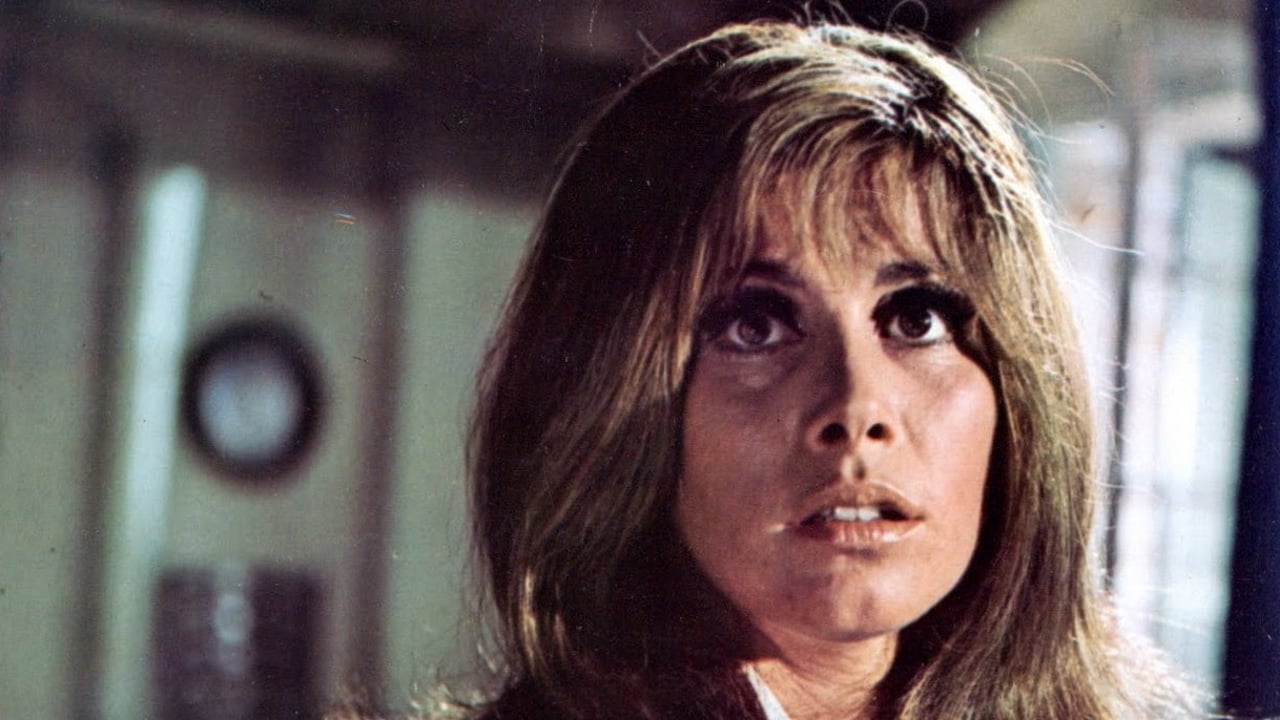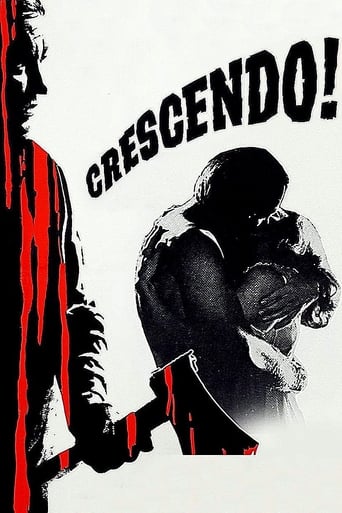Ketrivie
It isn't all that great, actually. Really cheesy and very predicable of how certain scenes are gonna turn play out. However, I guess that's the charm of it all, because I would consider this one of my guilty pleasures.
Grimossfer
Clever and entertaining enough to recommend even to members of the 1%
Lollivan
It's the kind of movie you'll want to see a second time with someone who hasn't seen it yet, to remember what it was like to watch it for the first time.
Brennan Camacho
Mostly, the movie is committed to the value of a good time.
Leofwine_draca
A disappointingly lacklustre psycho-thriller from the Hammer stable, penned by the ubiquitous Jimmy Sangster and directed by Alan Gibson, who gave us the camp classic Dracula 1972 AD. CRESCENDO is a middling film that goes over previously-covered ground; for instance one of the big "surprise" twists is that there's a psychopathic twin living locked in a hidden room. Hmm, now where have we heard that one before? The script is heavy on the dialogue and exposition and it's fair to say that not a lot happens during the running time.What we're stuck with is a single-location thriller with plenty of fairly obvious character secrets, some occasionally intense acting and a lack of horror content all-round: there are only three murders in the film, and none are particularly gory (the producers compensate by throwing in lots of gratuitous nudity instead). The film's best parts are probably the recurring surreal and artistic dream sequences/nightmares that Olson's character suffers; these slow-moving segments are the only powerful moments in the entire film.The rest of the movie consists of plenty of sinister glances, cover-ups and a general lack of non-activity all round. Sometimes action-free films can be interesting and CRESCENDO does have a few points in its favour. Technically it's perfect, with excellent camera-work and editing throughout. Sangster's script creates some interesting character motivations and idiosyncrasies to have some fun with and the classical score is above average for genre standards.Cast-wise, most actors here are familiar from later roles but were just starting out when this film was made. Stefanie Powers (TV's HART TO HART) is the young, attractive American student come to write her thesis, and Sangster gets her to go through the paces, although she doesn't get menaced enough for my liking, except at the finale. Margaretta Scott plays the popular role of "ageing female loony" (joining others like Bette Davis and Lana Turner from the period) to some degree of success whilst the seductive Jane Lapotaire (THE ASPHYX) is excellent as a saucy French maid, playing up to all the clichés her seedy character cries out for.Acting honours go to James Olson (AMITYVILLE II), an always-underrated actor putting in one of his finest turns here, playing both roles of a pair of twin brothers. One is mad and the other's crippled in a wheelchair, so he has lots of material to work with and performs admirably. A young Joss Ackland (LETHAL WEAPON 2) is also on hand, putting in a nice turn as the ever-sinister butler. Despite a myriad of flaws, CRESCENDOis a mildly watchable film suffering from a fair case of boredom. Fans who like their horror old-fashioned and plot-focused rather than exciting and bloody might get a kick out of this; I would say it's okay, but nothing special.
edwagreen
Stefanie Powers got more than she was wishing for when she meets and stays in the home of a wealthy widow, whose husband was a great composer. Powers is there to do research on the latter in order to obtain her master's degree; however, she encounters much more as the film descends quickly into the macabre.James Olson is the paralyzed son in this way over-the-top drama. Margaritta Scott does quite an imitation of Joan Fontaine here. She sounds just like her, and she can become quite eerie as well.Powers realizes quickly that it's time to exit as all sorts of strange things seem to happen. There is absolute mayhem, drug addiction, murder, seduction, you name it.Of course, we have the resolution of the twin. Normally, a cop-out, but the film is so dreadful by then that you just don't care.
MARIO GAUCI
This was the last of Hammer's 10 psycho-thrillers to get watched by me: in the long run, it is a middle-of-the-road effort, not particularly good but neither is it among the worst. Still, the film has palpable deficiencies, first and foremost because it is severely undercast (though lead Stefanie Powers had already co-starred in the above-average FANATIC aka DIE! DIE! MY DARLING {1965} from the same stable: incidentally, I regret not giving that one a spin as part of my recent tribute to its late director Silvio Narizzano!) and over-familiar – to say nothing of being essentially dreary – in plot line. In fact, it borrows the French setting, wheelchair-bound protagonist and the mysterious room from TASTE OF FEAR aka SCREAM OF FEAR {1961}, the hallucinations pertaining to a past crime from NIGHTMARE {1964} – both among the company's top outings and both also scripted by the late Jimmy Sangster, who here reworked Alfred Shaughnessy's original scenario…which had actually been intended for Michael Reeves, the promising but short-lived director of WITCHFINDER GENERAL {1968}! – and the domineering mother from FANATIC itself. By the way, the pool-as-murder-setting owes its origins to Henri-Georges Clouzot's seminal DIABOLIQUE (1955), which – along with Alfred Hitchcock's even more celebrated PSYCHO {1960} – was virtually the template for all of these Hammer shockers to begin with! Another clear link to the latter's cinematic universe is the molding of one character into the personality of another, now deceased, which was at the center of both his REBECCA (1940) and VERTIGO (1958)! One additional motif here is the eerie presence of broken dolls, which may very well have already been employed by some earlier Hammer shocker but was certainly a vital feature of Freddie Francis' THE PSYCHOPATH (1966): while this was made for the company's rival Amicus, its director had contributed a trio of titles to the British House Of Horror's Grand Guignol-infused subgenre.The afore-mentioned dreams that afflict hero James Olson (who had just starred in Hammer's goofy 'Space Western' MOON ZERO TWO {1969}) do rather give away the final twist (much-abused over the years), especially with the repetition but, then, the plot does incorporate a number of red herrings which makes one think the narrative will be going a certain way only for it to change direction before long. These have to do with the sordid goings-on in the central mansion and the sleazy characters that inhabit it, the others being Margaretta Scott – whom I was mainly familiar with from the mammoth Alexander Korda/William Cameron Menzies sci-fi THINGS TO COME (1936) – as Olson's "obsessed" mother (determined to keep the memory of her late and distinguished composer husband alive), Jane Lapotaire as the "sensuous" maid (who procures Olson with his heroin fix for sexual services rendered – the film is reasonably explicit in this regard – though at the same time deluding herself that she can one day become his wife) and "sinister" manservant Joss Ackland (who seems to have something going with the latter as well but nothing is eventually made of it!). I deliberately quoted the adjectives utilized in the accompanying theatrical trailer (for the record, though CRESCENDO was recently issued on DVD-R as part of Warners' "Archive Collection", the copy I watched came via a serviceable VHS source) to describe each of these three characters! To the house arrives young, pretty music teacher Powers who has decided to research the life and work of Scott's husband for her Masters degree; the main piano theme, while quite good in itself, does receive a thorough work-out amid the proceedings. Another quibble I have with the script expressly concerns her presence there (though it is not limited to the film under review), that is to say, if the household obviously concealed some dark secret that would invariably bring the whole crushing down (thankfully, not literally) on its occupants, why tempt Fate by inviting an outsider into their fold? The climax, then, is appropriately intense but also not exactly inspired (with Ackland's demise proving especially unconvincing) and abrupt into the bargain. Indeed, even if the handling here of Hammer newbie Alan Gibson was appreciated by some, I had always been somewhat wary of his involvement since he would subsequently helm the notorious last two entries in the company's "Dracula" franchise, which brought the mythical vampire Count uneasily into contemporary times (though he still could not tarnish the reputation of genre icons Peter Cushing and Christopher Lee)! Even so, I did enjoy one of his two contributions to the HAMMER HOUSE OF HORROR (1980) TV series (which had also starred Cushing) and was intrigued enough by the picture that would follow CRESCENDO, namely the obscure but impressively-cast telepathic horror GOODBYE GEMINI (1970), that I acquired it soon after this viewing...
misterfarkyharse
This is one of those films that rarely gets a good review. In fact it's been pretty much forgotten! It probably isn't one of Hammer's greatest achievements but it is by no means one of the worst. There are some rather uneventful scenes but I think they add to the suspense. The photography is very effective in places and the setting is quite haunting in a picturesque kind of way. The music which obviously is a major part of the story also adds to the more sinister scenes. The best performance comes from the seductive and eccentric maid, Lilliane (played by Jane Lapotaire) and Joss Ackland also puts in a fine performance as Carter (the butler/minder). It is not available on DVD and probably never will be, so if it's ever shown on TV it's certainly worth a look at.

